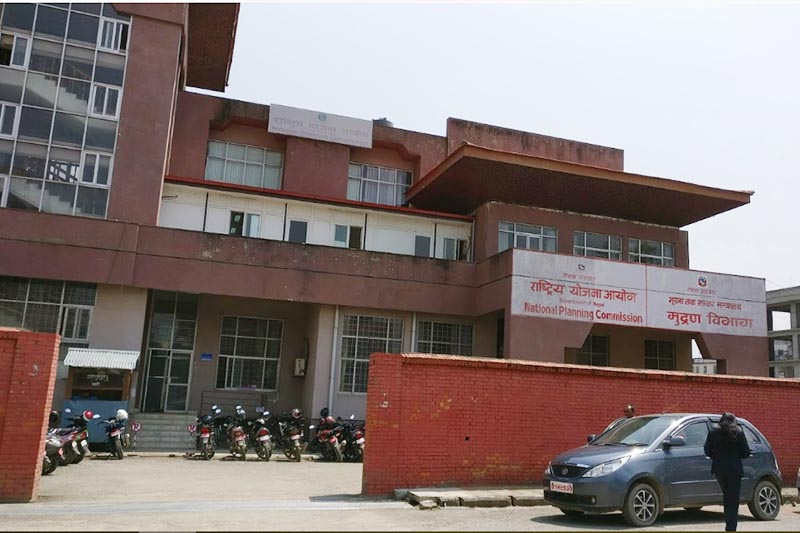

The Approach Paper of the 16th Five-year Periodic Plan (2024/25- 2028/29) has been approved. A plenary meeting of the National Planning Commission (NPC) convened at the official residence of the Prime Minister at Baluwatar today endorsed the Approach Paper of the 16 Plan, NPC spokesperson Suman Dahal said. The Prime Minister is the Chair of the NPC as per the provision of the National Planning Commission (Formation and Operation) Directives. The NPC has prepared a work plan extending till February 12, 2024 to develop the document of the new periodic plan and have it approved. Work on formulation of the five-year periodic plan (2024/25- 2028/29) had been started in the second week of June in accordance with the Procedures on Institutional Provisions for Formulation of the 16th Plan, 2023 prepared by the NPC. A timeline has been set for getting the periodic plan approved from the Council of Ministers by February 12, 2024. As per the Procedures, there is a Steering Committee under the convenorship of the NPC Vice-chair and the Sector Committees under the convenorship of the members. The Approach Paper of the 16th Plan was sent to the Commission’s meeting after approval from the Steering Committee with suggestions. Before this, the NPC had held discussions with subject experts on various sectors since June and collected suggestions on the Approach Paper. Now after this the NPC will write to all the ministries for preliminary discussions and for providing the required particulars from the sectoral ministries regarding formulation of the detailed plan along with the approved Approach of the plan. NPC has said suggestions would be taken from the sectoral ministries within August 24. Similarly, preparations for the overall economic and investment outline (Economic Modeling) will be done within the last week of August. The Commission aims to prepare and endorse the sector-wise integrated preliminary draft of the 16th Periodic Plan by the last week of September. Subsequently, copies of the draft will be provided to the National Development Council and its members by the first week of October, it is stated in the working procedures. To ensure inclusivity and gather inputs, discussions and interactions with the province and local levels regarding the formulation of the plan have been scheduled for the first week of November. Based on the opinions and submissions collected during these interactions and discussions, a revised draft of the Plan is expected to be prepared by the last week of November. In the first week of December, discussions will be held with federal parliament members, office-bearers of major political parties, civil society representatives, intellectuals and professionals, ministers from the sectoral ministries, secretaries, and development parties regarding the formulation of the plan The revised draft of the 16th Periodic Plan, incorporating submissions from the national level, will be prepared by the last week of December. It is expected to be recommended by the Steering Committee for presentation in the National Development Council by the first week of January 2024. Similarly, the revised draft of the approach paper will be endorsed along with the feedback from the National Development Council by the second week of January. The final draft is scheduled to be prepared by the first week of February. The Council of Ministers is then expected to endorse the documents of the 16th Periodic Plan by the second week of February. The Plan is set to be implemented from the next fiscal year, starting on July 16, 2024. Nepal’s Constitution, National and Sectoral policies, the 15th Periodic Plan and its review, strategies to upgrade the country from the Least Developed Country status, advancement towards the achievement of Sustainable Development Goals, and the mid-term expenditure structures will be considered during the formulation of the 16th Periodic Plan, as reported by the NPC. The Commission’s Vice Chairperson is coordinator of the steering committee while Chief Secretary, chair of the District Coordination Committee Federation, all members of the National Planning Commission, Governor of the Nepal Rastra Bank, and secretaries of the ministries are a part of the committee. Similarly, chief analytics officer of the National Statistics Office, chief secretaries of all seven provinces, vice chairperson of the national planning commission of all provinces, chief executive officer of the Investment Board Nepal, and Chairpersons of the Municipal Association of Nepal and the National Association of Rural Municipalities in Nepal are the members. Five sectoral committees have been formed to work on the draft of the periodic plan. The five sectoral committees include the macroeconomic blueprint and comprehensive plan, economic sector, infrastructure and environment sector, social sector and institutional development and good governance sector. Similarly, a technical committee has been formed for the coordination, assistance and facilitation with the sectoral ministries and various sectors. The 16th five-year periodic plan has accorded high priorities to digital database and e-governance. —